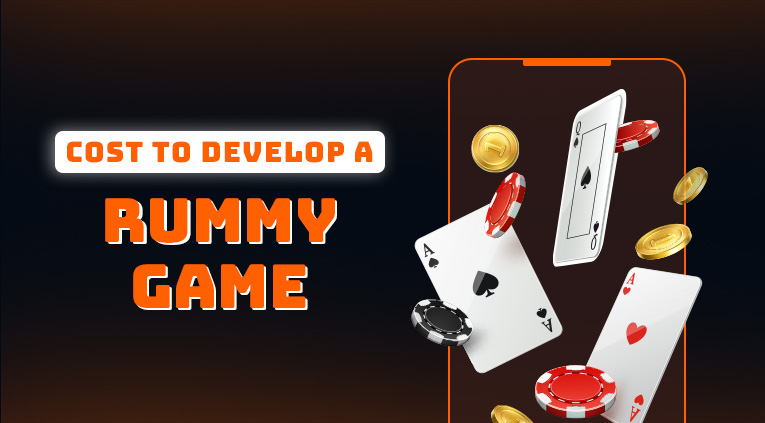Real money games have gained immense popularity, and rightfully so, due to their ability to provide players with the opportunity to win actual monetary rewards in thrilling online competitions and tournaments. However, one may wonder about the expense associated with hiring real money game developers and developing a bespoke game.
Depending on the match’s intricacy and features, creating a real money game may be pricey. Budgeting for development costs requires careful consideration of all aspects, including design, programming languages used, hosting fees, marketing expenditures, and more. We’ll go over all you need to know about creating a real-money game in this article so you can decide on the project’s budget with confidence.
For individuals embarking on the entrepreneurial journey or those passionate about gaming, this article aims to provide a comprehensive overview of the expenses involved in developing a real money game. However, before diving into the intricacies, exploring some statistics of real money games is worthwhile.
Statistics
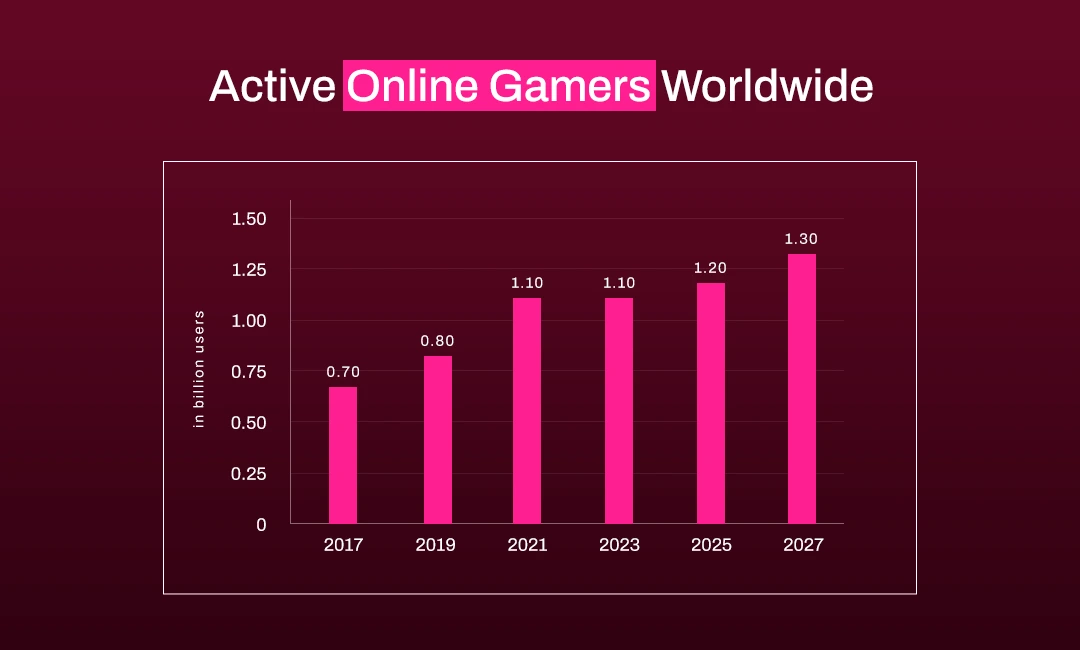
1. According to reports, there are approximately 1 billion active online gamers worldwide, and by the end of 2025, this figure will touch the mark of 1.3 billion active players.
2. In 2020, the global video gaming market was valued at around 174.9 million, growing by 19.6% YoY.
3. According to reports, around 50% of the Gen Z gamers in India and worldwide play games actively. These players are involved in both real money and non-real money games.
4. During 2022, Slotomania™ Slots Casino Games generated around 221.5 million U.S. dollars in revenues worldwide across the Apple App Store and Google Play, making it Playtika’s most successful app.
Looking at the statistics, opting for game development solutions and capitalizing on the growing market is highly profitable. On this note, let’s look at some of the thriving benefits of building real money games.
Benefits of Developing a Real Money Game
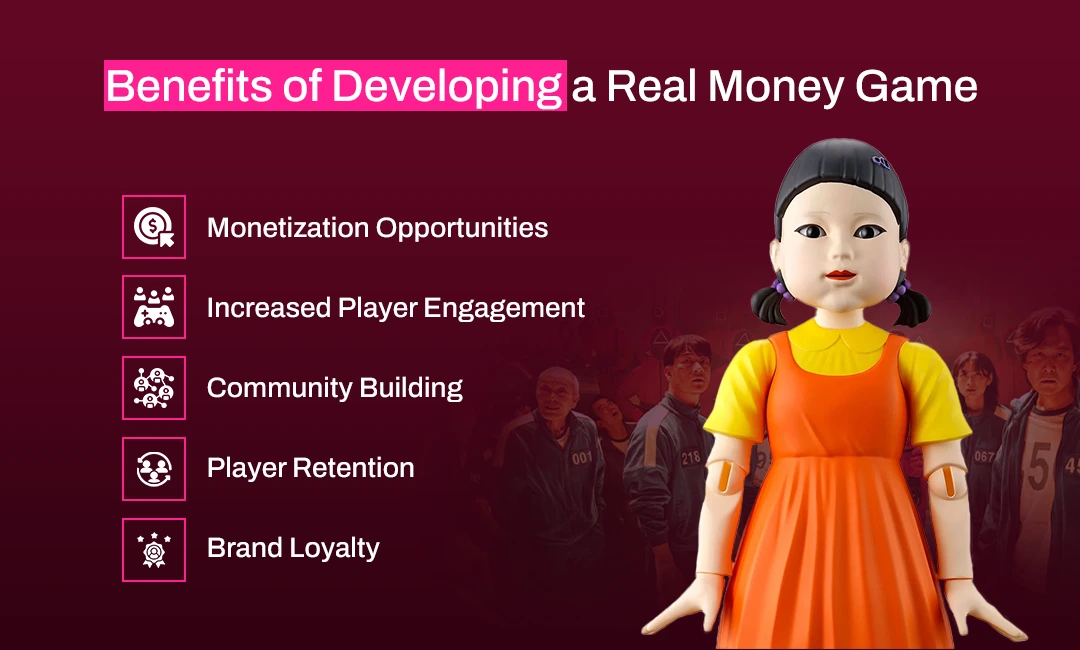
1. Monetization Opportunities
The potential for direct monetization is the primary and most immediate benefit of developing a real money game. Unlike free-to-play games, which rely on in-app purchases or advertisement revenue, real money games offer a more straightforward revenue stream. Players pay an upfront fee to play or enter competitions, providing developers and platforms with immediate income.
2. Increased Player Engagement
Real money games often succeed in capturing and maintaining player interest. The stakes are naturally higher when actual money is involved, and this can keep players engaged for longer periods as they strive to improve their skills and win. The thrill and excitement of potentially winning real money can turn casual gamers into dedicated ones.
3. Community Building
Real money games can foster a strong sense of community among players. These games aren’t just about winning money; they’re about the thrill of competition, the shared experiences, and the camaraderie that can develop among players. These communities can become self-sustaining, with players returning for the game itself and the social interactions and friendships they’ve formed.
4. Player Retention
The prospect of winning real money can be a powerful motivator, encouraging players to return to your game repeatedly. This can improve player retention rates, a critical factor in a game’s success. After all, acquiring a new player can be expensive, so keeping existing players engaged and invested in your game is crucial. Offering real money prizes can give players a compelling reason to stick around and keep playing.
5. Brand Loyalty
Developing a real money game can help to build strong brand loyalty among your player base. When players invest their time and money into a game, they’re not just investing in the game itself but in the brand behind it. If you can deliver on the promise of a fair, fun, and potentially lucrative gaming experience, you’ll earn your players’ trust and loyalty.

After exploring the benefits, let’s look at the process of developing highly-quality real money games. Knowing the process will give you an edge before you hire a professional game development company.
How to Develop a Real Money Game?
Developing a real money game is a challenging task. It requires a blend of creativity, technical skills, an understanding of legal aspects, and intelligent marketing strategies. However, the process of building a real money game can be broken down into manageable steps.
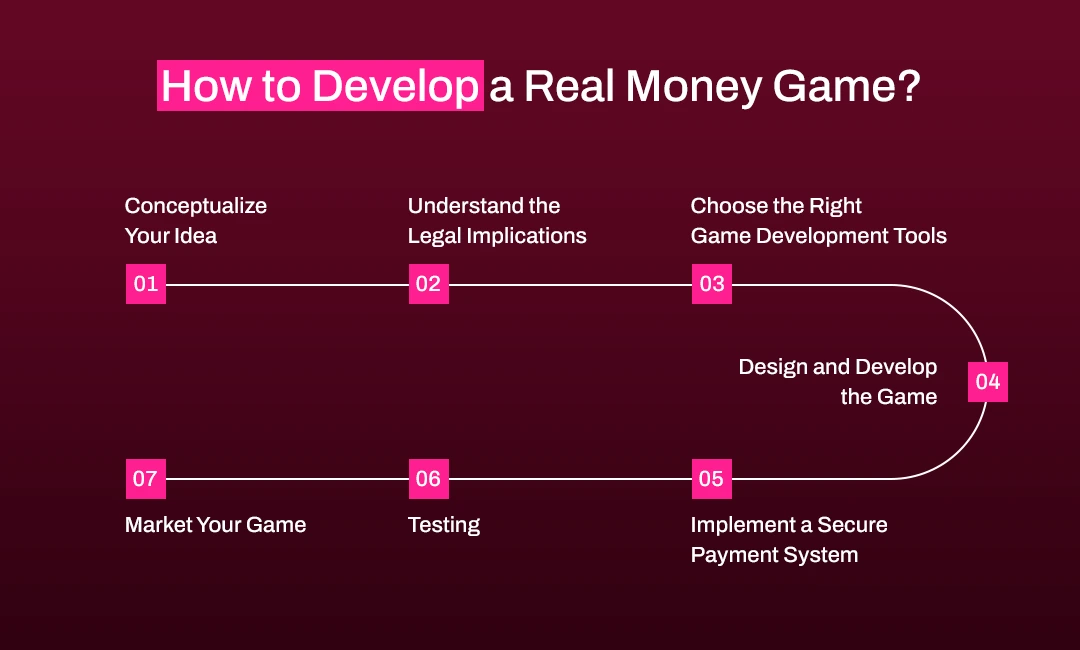
1. Conceptualize Your Idea
Every great game starts with an idea; this initial phase is about letting your creativity run wild. Think about the kind of game you want to create, what the gameplay is like, or what unique features it will have. You may want to sketch your ideas or create a mood board to visualize them better. Remember, the more unique and engaging your game concept is, the better chance it has of standing out in the crowded gaming market.
2. Understand the Legal Implications
Real money games often straddle a fine line between gaming and gambling. Therefore, it’s crucial to understand the legal implications of your game. Different laws and regulations may apply depending on your location and target markets. These can range from age restrictions to licensing requirements. It’s advisable to consult with a legal expert to ensure that your game complies with all relevant laws. Thus, before hiring game developers, you must figure out legal formalities.
3. Choose the Right Game Development Tools
Picking the right tools is a vital part of the game development process. There are various software options available, each with its strengths and weaknesses. Unity, for example, is known for its versatility and vast community. Unreal Engine, on the other hand, offers high-end graphics capabilities. The choice largely depends on the needs of your specific game. Consider factors such as the complexity of your game, required graphics quality, and your team’s familiarity with the software.

4. Design and Develop the Game
Once you’ve chosen your tools, it’s time to start designing and developing your game. This involves creating visual elements like characters and environments and programming the game mechanics. It’s essential to keep the user experience in mind throughout this process. The game should be fun but intuitive and easy to navigate. Also, consider incorporating social features, like leaderboards or chat functions, to foster a sense of community among players.
5. Implement a Secure Payment System
A secure payment system is the backbone of any real money game. Players must trust that their money is safe and can quickly deposit and withdraw funds. Look for payment providers that offer robust security measures, such as encryption and fraud detection. Additionally, provide various payment options to cater to different player preferences.
6. Testing
Before launching your game, it’s essential to test it thoroughly. Look for any bugs or glitches that could disrupt the gameplay or allow players to exploit the system. Testing should also include the payment system to ensure that transactions are processed correctly and securely. Consider conducting beta testing with a small group of players to gather feedback and make necessary improvements.
7. Market Your Game
Once your game is ready, it’s time to get it in front of players. Effective marketing strategies can range from social media advertising to influencer partnerships. You might also consider offering a welcome bonus or other incentives to attract new players. Remember, ongoing marketing efforts are as important as the initial launch campaign to keep attracting new players and retaining existing ones.
As we know the process now, it’s also crucial to understand the overall timeline of developing a custom real money game for your users.
How Long Does It Take to Build a Real Money Game?
Real money game development is a task of considerable magnitude, with multiple factors influencing the time frame. To start, the complexity of the game plays a pivotal role. A simple game with basic mechanics and minimal graphics might take only a few months. In contrast, a complex game with intricate mechanics, high-quality graphics, and a sophisticated backend to handle actual money transactions could take a year or more.
Next, we must consider the team working on the project. A small, inexperienced team might take significantly longer than a seasoned team of industry veterans. The latter will have experience overcoming common development hurdles, allowing them to streamline the process. They’ll likely have a more efficient workflow, shaving weeks or months off the development time.
Lastly, the testing phase is crucial in determining the timeline. This stage involves rigorous quality assurance tests to ensure the game functions as intended. Security measures must also be robust, especially when real money is involved. This process can be time-consuming but is vital to the game’s success. Depending on these variables, building a real money game could take 6 to 8 months or over a year. Now, let’s dive into the factors that affect the cost of building a real money game.
Factors Affecting the Cost of Creating a Real Money Game
Game development involving real currency is a lucrative endeavor, but it has its own set of costs. Let’s delve into the various factors affecting the cost of creating such games.
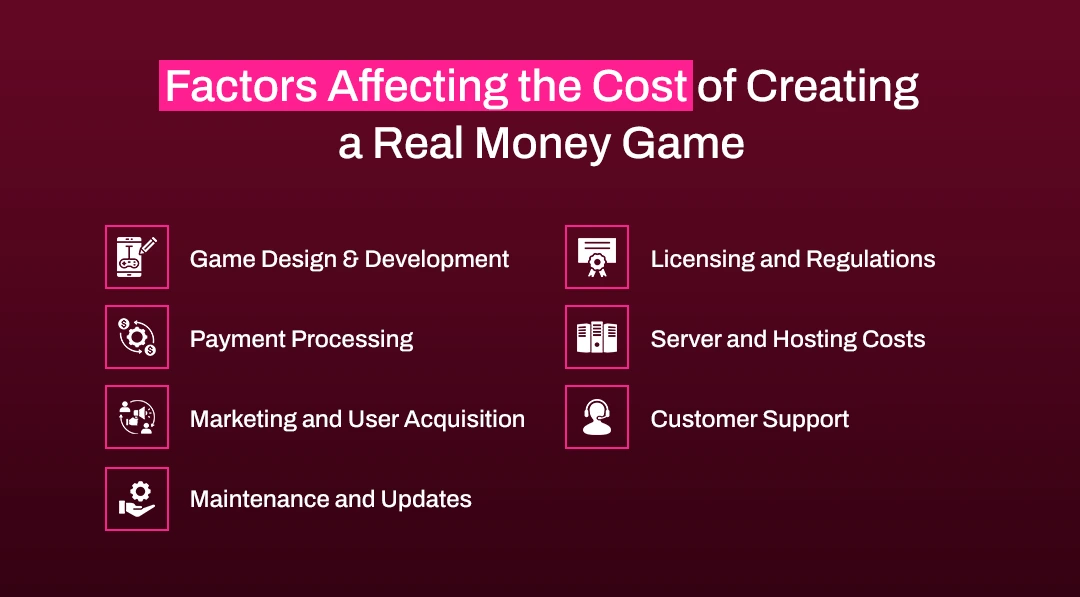
1. Game Design and Development
The first and likely most significant cost lies in the game design and development process. This involves conceptualizing the game, creating the artwork, programming the game mechanics, and testing for bugs or glitches. The complexity of your mobile game development directly influences the cost here. A simple game with basic graphics and mechanics will be less expensive than a complex game with high-quality graphics and intricate mechanics.
2. Licensing and Regulations
You must adhere to specific regulations and obtain the licenses for real money games. These regulations vary drastically from region to region and can significantly impact your budget. For example, obtaining an online gaming license in some jurisdictions can be quite costly, while others may have more affordable options. It’s crucial to research and budget for these expenses in advance.
3. Payment Processing
Another critical factor is setting up and maintaining a secure payment processing system. Players need to deposit and withdraw money safely and efficiently. This requires integrating trusted payment gateways, often charging a fee per transaction or a fixed monthly rate. Also, ensuring the security of these transactions to prevent fraud or theft is paramount and might require additional investment in security systems.
4. Server and Hosting Costs
Real money mobile game development solutions often require robust servers to handle high traffic and maintain performance. The cost of these servers depends on their capacity and the expected volume of players. Additionally, hosting the game on a private server or a cloud-based platform can add to your overall expenses.
5. Marketing and User Acquisition
Once your game is ready, you’ll need to attract players. Marketing and user acquisition can take a significant portion of the budget. This includes costs for advertising, public relations, social media promotions, and potentially partnering with influencers or other marketing channels.
6. Customer Support
Providing excellent customer support is essential in maintaining player trust, especially when real money is involved. This includes setting up a support team, investing in customer service tools, and training staff. The scale of your customer support operations will depend on the size of your player base.
7. Maintenance and Updates
Lastly, once the game has launched, it will need regular maintenance and updates to keep players engaged and ensure smooth gameplay. This could involve fixing bugs, introducing new features, updating the game based on player feedback, and continuously monitoring for potential issues. These ongoing costs should be factored into the initial budgeting process. Moreover, Professional Game Developers take care of all maintenance and updates.
Many factors influence the cost of creating a real money game. Each element significantly affects the overall budget, from game design and licensing fees to marketing and maintenance costs. Understanding these costs beforehand can help game developers plan more effectively and create a successful real money game. After exploring the cost-influencing factors, let’s explore the tentative cost of building these mobile games.
How Much It Costs To Develop a Real Money Game?
The financial implications of developing a real money game can be as diverse as the games themselves. The cost to hire game developers isn’t simply a flat rate; it’s a complex fusion of different elements, each carrying its weight. From conceptualization to development, testing to marketing, the journey of creating a real money game is multifaceted, and each step comes with its own price tag.
The conceptualization phase, for instance, demands a significant investment of time and creativity. Here, ideas are born and refined, and this process often involves market research, brainstorming sessions, and a deep dive into gaming trends. This stage is crucial in defining the game’s unique selling proposition, and while it might not require substantial monetary investment, it does require a considerable amount of intellectual capital.
Next, the development phase is where the budget is usually allocated. This involves hiring a skilled real money game development team, designers, and testers who work collaboratively to bring the game to life. Thus, when you look for real money game developers for hire, it’s essential to clarify what exactly you need in your game.
Additionally, post-launch expenses such as server maintenance, customer support, and regular updates must also be factored into the overall budget. Building a real money game from scratch with basic MVP features can cost between $25k to $40k. If you want to develop such a game with additional features & functionality it costs $40k to $75k or more. To know the exact cost of developing a real money game as per your requirements, feel free to contact our experts for a detailed price estimation.
Strategies for Reducing Real Money Game Development Cost
The game development industry can be quite an expensive field, especially when it comes to real money games. However, there are several strategies that can help you reduce these costs without compromising the quality of your game. Here are some of them:
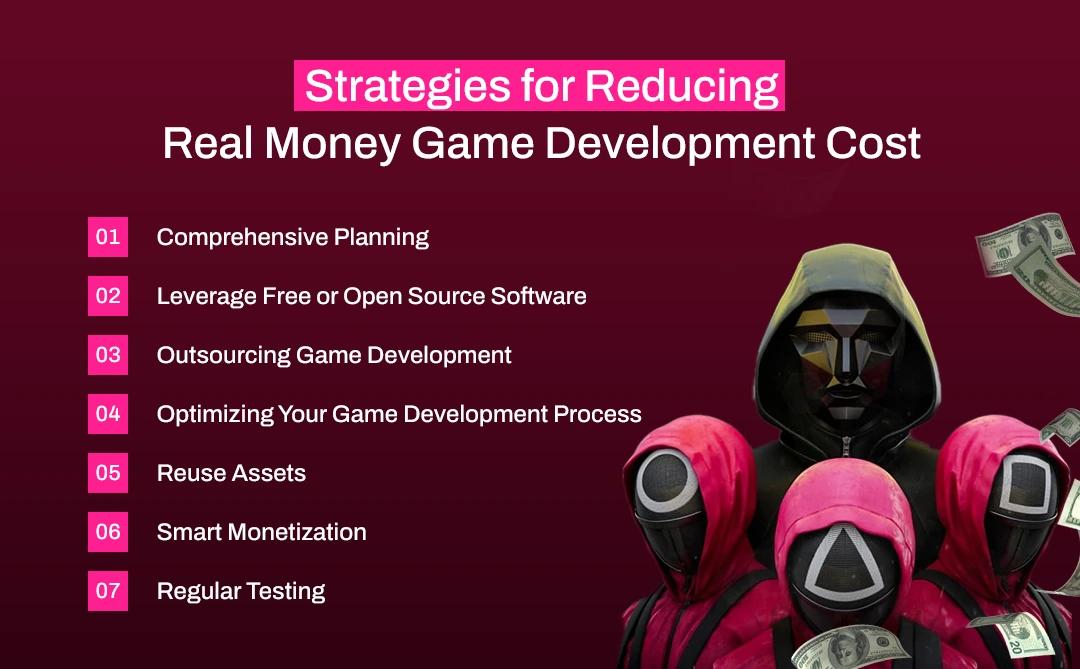
1. Comprehensive Planning
One of the first steps you should take in game development is thorough planning. This includes understanding your target audience, deciding on the game mechanics, creating an engaging storyline, and visualizing the graphics. A detailed plan can prevent unnecessary changes and revisions during the development process, thus saving time and money.
2. Leverage Free or Open Source Software
There are numerous free or open-source software tools available that can significantly cut down your game development costs. These include game engines like Unity and Godot, and graphic design tools such as Blender and GIMP. Utilizing these resources can help you develop high-quality games at a fraction of the cost.
3. Outsourcing Game Development
If there are certain aspects of game development that are beyond your skillset or resources, consider outsourcing game development. This could range from graphic design to coding tasks. Just ensure that you choose reliable contractors who offer good value for their services to ensure cost-effectiveness. Opting for professional real money game development services from an experienced game development outsourcing company like AGS can help you streamline the process and optimize the cost.
4. Optimizing Your Game Development Process
Another way to reduce costs is by streamlining your game development process. This could involve adopting agile methodologies, automating repetitive tasks, or improving communication within your team. An efficient process leads to quicker development times and, consequently, lower costs.
5. Reuse Assets
If you’re developing multiple games, reusing assets such as character models or background music can save both time and money. Not only does this reduce development costs, but it also ensures consistency across your games.
6. Smart Monetization
Monetization is a crucial aspect of real money game development. Think about incorporating multiple revenue streams like in-app purchases, advertisements, and premium versions. A robust monetization strategy can offset development costs and generate steady income.
7. Regular Testing
Regular testing throughout the development process can help identify bugs or glitches early on. Fixing these issues before they escalate can prevent costly repairs and reworks later on. Moreover, take advantage of the wealth of knowledge shared by other game developers. Learning from their successes and mistakes can help you avoid common pitfalls and save on development costs.
By implementing these strategies, you can significantly cut down on the cost of real money game development. The ultimate goal is not just to save money, but to deliver a high-quality game that players will enjoy. When you work with a leading and innovative real money game development company like Auxano Global Services, you can be assured of top-notch execution from ideation to product launch.

Why Hire Auxano Global services for Real Money Game Development?
Auxano Global Services is a top-rated game development company that offers comprehensive end-to-end solutions. We have years of experience in game development and are well-versed with industry best practices. Our game developers ensure that the games are built with high performance, quality, and scalability in mind.
We use Agile methodology to develop real money games and make sure that every step is done right the first time around. This gives you peace of mind knowing that the game is built on a secure and reliable platform. We also provide ongoing support to ensure your real money game runs like a well-oiled machine.
Moreover, our team of game developers is passionate about providing the best user experience. They are knowledgeable in the latest technologies and continuously strive to stay ahead of trends in order to deliver the best gaming experience.
Wrapping up!
In conclusion, it’s important to understand the cost of developing a real money game before embarking on the project. It’s essential for developers to create a comprehensive budget that takes into account all the factors mentioned above. Working with an experienced mobile game development company like Auxano Global Services can help you bring your vision to life and ensure that your real money game is a success.
Frequently Asked Questions
-
1. What is the typical cost of developing a real money game?
The cost to develop a real money game can greatly vary. It depends on several factors, such as the game’s complexity, the technology used, the number of platforms it will be available on, and the developer’s experience and reputation. It could range between $25,000 to $75,000 or more. For a detailed estimate of the cost of developing a real money game according to your requirements, feel free to contact our experts.
-
2. Does developing a real money game cost more than a regular game?
Not necessarily; while real money games require additional security measures and compliance with gambling regulations, the primary cost drivers remain the same – complexity of design, quality of graphics, and the overall user experience might be affects the cost.
-
3. How does the cost of maintaining a real money game compare to its development cost?
Maintenance costs for real money games can be significant. They include ongoing security updates, regulatory compliance, customer support, and periodic enhancements to keep the game engaging.
-
4. Can I reduce the cost of real money game development by using pre-built software or platforms?
Yes, using pre-built platforms or game engines can help reduce real money game development costs. However, customization may be limited, and there could be ongoing license fees. It’s crucial to balance cost savings with the need for a unique, engaging gaming experience.
-
5. Is it worth investing in high-quality graphics for my real money game?
Investing in high-quality graphics can significantly enhance player engagement and retention, potentially leading to greater revenue in the long run. While this means higher upfront costs, it could prove to be a worthwhile investment for the success of your real money game.



![Outsource Game Development [Complete Guide 2023]](https://www.auxanoglobalservices.com/agsresources/wp-content/uploads/2023/06/Outsource-Game-Development-Complete-Guide-2023.jpg)
